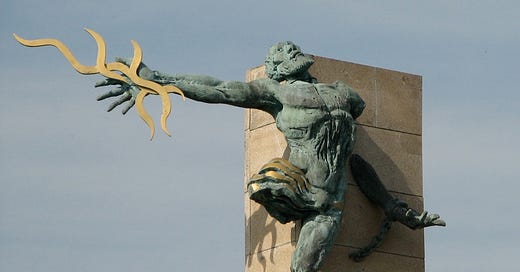In the Kantian scheme, the rational subject is the ground of metaphysics, but what metaphysical unconscious does that theory spring from? Where do we get the intuition that man is the measure of all things. And not just the measure - the creator of all things.
We have all heard of the myth of Prometheus in some form or the other:
Moral of the Story: don’t mess with the gods.
Looks like Houston didn’t receive that message from the heavens. The rational order - the Great Chain of Being - gave purpose to our lives for it meant that we labored in the shadow of the divine. Laboring in a factory for the man doesn’t have the same existential charge.
Instead of the gods getting rid of humans, humans got rid of the gods. But it’s a lonely universe out there, a disenchanted world in which we struggle for no reason whatsoever. Once upon a time we were created in the image of God, but now that God’s dead and we have to create ourselves, the question arises:
In whose image should we create ourselves?
There’s the movie star, there’s the politician, there’s the scientist, there’s athlete. And as capitalism goes from strength to strength, there’s always Elon Musk. But if I had to pick the core representation of the human as a creator of the world, it would be the superhero.
Why worship losers like Prometheus (winners don’t get caught, as Trump would say) when you can model yourself on someone who is more elegant than a bird and faster than a plane.
The alien has replaced both God and the Devil.
I will be honest; I am bored by the Promethean Man, the archetype of the Anthropocene. He’s the dominant answer to the human question - powerful, clever, sometimes generous and often brutish. However, there’s a different kind of man (also gendered, but that’s to be expected in a four hundred year story) who also answers the human question - a somewhat sweet, somewhat romantic, somewhat stupid and somewhat tragic man.
I am thinking about the Windmill chaser Don Quixote, the man who never found what he was looking for, and in the process gave us the image of the hopeless romantic endlessly curious modern human. Only the modern era can spawn the Quixotic man. Such is his attraction that Pierre Menard wrote a much better novel, seeing much further than the original because he was standing on Cervantes’ shoulders. And what did he see: the very same landscape, a terrain that was identical with the original. As Borges says:
Pierre Menard did not want to compose another Quixote, which surely is easy enough-he wanted to compose the Quixote. Nor, surely, need one be obliged to note that his goal was never a mechanical transcription of the original; he had no intention of copying it. His admirable ambition was to produce a number of pages which coincided-word for word and line for line-with those of Miguel de Cervantes.






